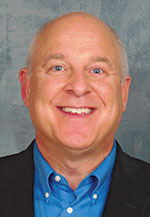Ken’s 12-Pack / Ken Ogorek
Things most Catholics wish they knew better: You first. No, you first!

Sixth in a yearlong catechetical series
Little things mean a lot; so the saying goes. A lot of 1970s and 1980s catechesis included a small, single feature that has big implications for our life of faith if not understood correctly.
Who made you?
The architects of catechesis from the late 1960s through the early 1990s often expressed dissatisfaction with a question-and-answer approach to faith formation. “Better to start with human experience,” said the experts.
Methodological gains were definitely made in the ‘70s and ‘80s; to deny the benefits of exploring human experience as a springboard for religious education is to overgeneralize about the deficiencies of post-Vatican II catechesis, as if to say that nothing good happened catechetically in the years immediately following this Church council.
But like all good emphases, overemphasis reared its ugly head, and soon we relied too much on human experience for seeking to understand our utterly transcendent Creator. Ultimately, human experience, action and initiative fall short when forming our minds, hearts and souls to know, love and serve almighty God.
“Listen, Lord, for your servant is speaking”
It’s an age-old temptation. Creating God in our own image and likeness. Making ourselves the center of attention in ways that aren’t helpful. Defying St. John the Baptist’s example that Jesus must increase while we decrease.
Doctrinal deficiencies in religion textbooks used by many adult Catholics as children include a trend that gives insufficient emphasis on God’s initiative in the world with a corresponding overemphasis on human action. What we gained by de-emphasizing rote memorization, we lost by overstating the ability of human experience to connect with unfathomably beautiful mysteries like the Trinity, incarnation and paschal mystery to name a few.
While human experience is often a good starting point for a catechetical lesson (for example, our hunger for food can help explain the spiritual benefits of the holy Eucharist) it overplays the hand of modern catechesis to imply that God somehow depends on us to manifest his holy and perfect will.
God always makes the first move
While our response of faith is crucially important to our relationship with God, it’s important to remember that God always makes the first move—inspiring us to repentance and reconciliation.
Ironically, by overemphasizing our role in establishing and deepening a relationship with our loving God, some post-Vatican II catechetical gurus left us with the impression that so long as we try hard to be good people—nice people—our eternal salvation is assured.
St. Augustine observes that God created you without your permission, but he won’t save you without your consent. Your participation in the drama of your salvation from sin and death is essential; but without the free, unmerited gift of salvation offered us by Jesus, through his suffering, death and resurrection, all of our actions, initiatives and experiences fall short. Jesus—only Jesus—saves.
Several “Ken’s 12-Pack” columns thus far have addressed specific doctrinal and moral teachings of our holy, Catholic Church; future pieces will do that as well.
This month, let’s remember that how you teach truth (for example, overemphasizing the use of human experience to teach all that God lovingly reveals about himself) can unintentionally lead to a distorted or inadequate grasp of the very truths a catechist tries to convey.
See you next month.
(Ken Ogorek, archdiocesan director of catechesis, has lost his six-pack
abs. But his 12-part series, whose theme is: Things Most Catholics
Wish They Knew Better, will run through December. He can be
reached at his archdiocesan e-mail address kogorek@archindy.org or
by using the contact information at
www.kenogorek.com.) †
